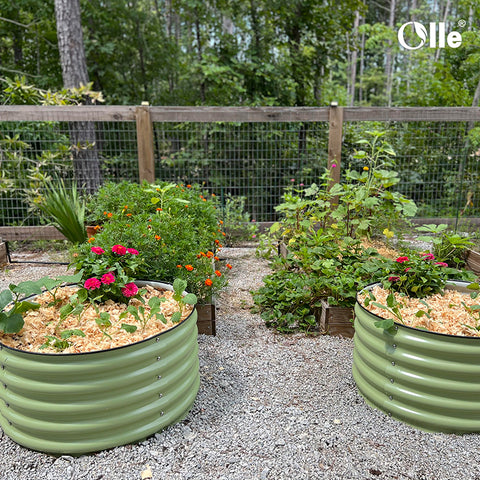Growing Eggplants in a Metal Garden Bed - Requirements for Success!
Hello everyone! Recently, I've been experimenting with growing eggplants in a metal garden bed, and I'd like to share some detailed insights and requirements with you. If you're interested in growing fresh eggplants at home, why not give this method a try?
Firstly, choose a suitable metal garden bed. Ensure that the bed is spacious enough, with a minimum depth of 60 centimeters, to provide adequate soil depth and root space for the eggplants to thrive. Metal beds are not only durable but also help retain soil moisture and provide excellent drainage.
Next, select the right eggplant variety. Depending on your growing region and personal preferences, choose eggplant varieties that are suitable for growing in a metal garden bed. Some varieties are well-suited for shorter growing seasons, while others thrive in warmer climates.
Ensure fertile soil. Soil quality is crucial when growing eggplants in a metal garden bed. Add organic fertilizers and compost to enrich the soil with nutrients and improve its structure. Additionally, eggplants prefer acidic soil, so maintaining a pH level between 6.0 and 6.8 is ideal.
Provide ample sunlight and water. Eggplants are sun-loving plants, so make sure your metal garden bed is exposed to abundant sunlight. They require at least 6 to 8 hours of direct sunlight daily for optimal growth. Additionally, keep the soil consistently moist but avoid overwatering, as excessive moisture can lead to root rot.
Regular fertilization and management. Eggplants are nutrient-demanding crops, so regularly apply moderate amounts of organic fertilizer to promote growth and yield. Moreover, timely weed control and pest management are essential to ensure the healthy development of the eggplants.
Finally, regularly inspect and prune the eggplant plants. Check the leaves and fruits for any signs of pests or diseases, and promptly remove any affected parts. Proper pruning encourages lateral branching and improved airflow, contributing to better plant growth and fruit development.
In addition to these requirements, here are a few additional tips:
Temperature management: Eggplants thrive in warm environments. Pay attention to maintaining appropriate temperatures during the growing season. If the temperature drops too low, it can adversely affect the growth rate. Consider planting eggplants in early spring or autumn or use protective coverings in colder regions.
Support and vertical growth: Eggplant plants can grow tall and may require support to remain stable. Use stakes or trellises to support the plants and prevent stem breakage or leaning. Additionally, vertical growth techniques can save space and enhance airflow, reducing the risk of diseases and pests.
Timely harvesting: Harvest the eggplants when they reach maturity, rather than allowing them to become overripe. Overripe fruits can hinder plant growth and reduce overall yield. Use shears or pruning tools to cut the eggplants from the plant, avoiding pulling or damaging the plant.
Crop rotation: To prevent soil diseases and pest buildup, practice crop rotation with eggplants. Plant them in different flower beds or garden areas, rotating with other vegetable crops. This helps maintain soil health and nutrient balance.
I hope these detailed requirements and tips will be helpful to those growing eggplants in a metal garden bed! If you have any questions or experiences to share, please feel free to leave a comment. Wishing you a pleasant and bountiful eggplant-growing journey!

